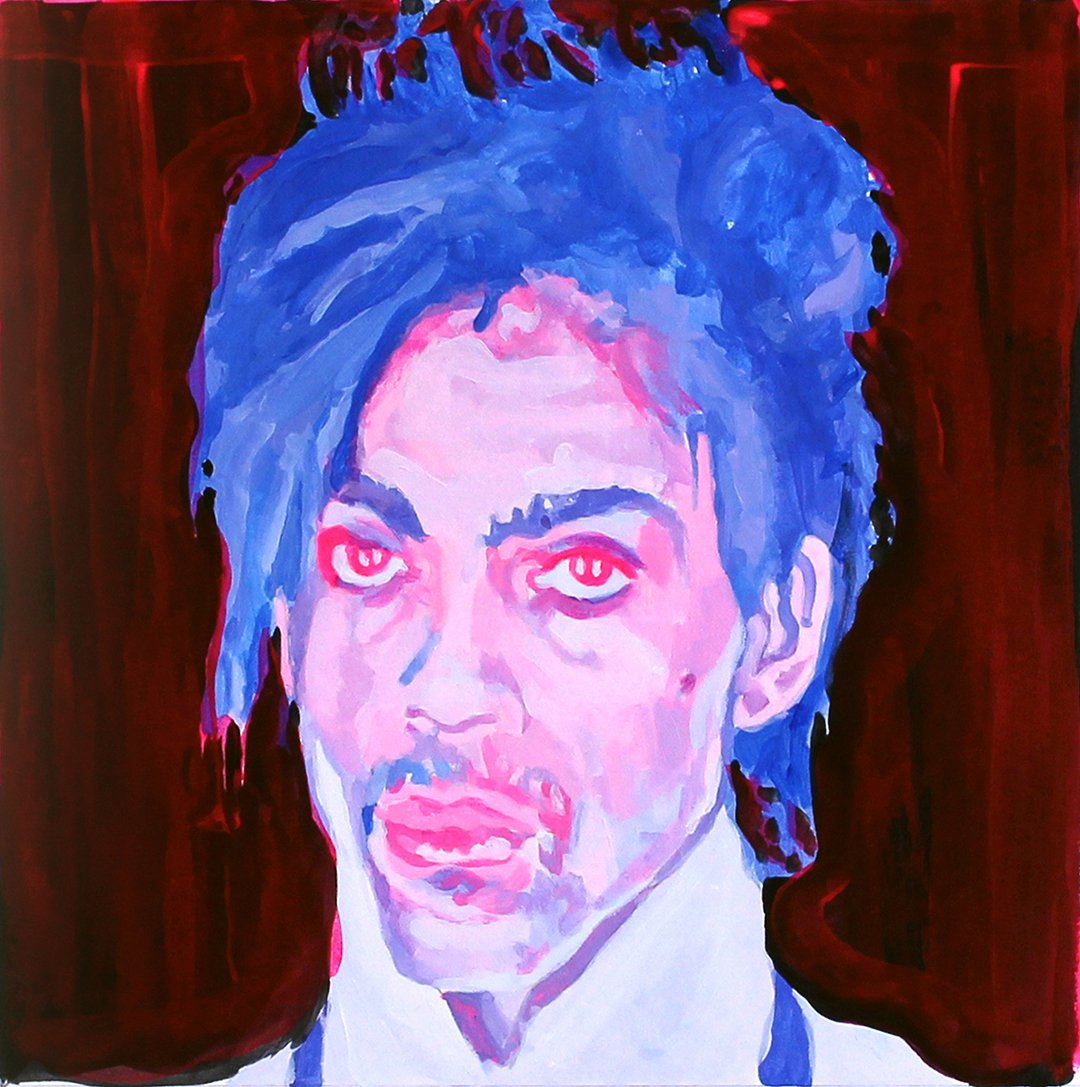
Photographer Lynn Goldsmith recently won a major victory in the Supreme Court, which ruled that the Warhol Foundation had violated her copyright when it licensed an Andy Warhol silk screen based on her portrait of the late musician Prince to a magazine. But while Goldsmith was fighting that legal battle, she was also on the lookout for other derivative works, and recently demanded that a Texas artist delete an Instagram post of a painting he made that was inspired by the case.
The artist, Ryan Sandison Montgomery, made two mixed-media paintings based on Goldsmith’s photograph. In March 2022, he posted one of them on Instagram under the title The Supreme Court as Andy Warhol as Lynn Goldsmith as Prince Not Laughing, according to the Texas outlet Glasstire. The artist hand paints images he finds online as a way to counteract digital mass media.
When Montgomery made his Prince paintings, he “had a bad feeling about the potential outcome” of Goldsmith’s case, he told Artnet News. “I believed that the potential new restrictions on artistic expression were a bad thing.”
What he wasn’t expecting was to hear from Goldsmith herself.
“You did not ask for my permission to copy my photo and I am ‘not laughing.’ Please do not force me to ask Instagram to delete,” Goldsmith in a direct message on Instagram, asking him to remove the post.
When Montgomery didn’t respond, she commented on the post, repeating her demand.
“Respectfully, this is my painting,” Montgomery responded.
The photographer wrote back, insisting that he needed her permission to make a derivative work from her piece.
Montgomery asked Goldsmith if she supported artistic censorship and the conservative majority of the Supreme Court secured by Donald Trump. That was the end of the exchange, but the interaction rubbed him the wrong way.
“I was stunned that Goldsmith had any response,” he said. “That her reaction was to claim that something I made in my home studio belonged to her was a complete surprise.”
“If she was in a David and Goliath battle with the foundation, why then make demands of an even lesser-known artist posting a similar image online?” Montgomery asked. “For what it’s worth, I never intended to sell these pieces and her name was always referenced in the titles of the work.”
It is unclear if Goldsmith believes that Mongomery’s artwork violated her copyright.
A screenshot of Ryan Sandison Montgomery’s exchange with Lynn Goldsmith on Instagram.
“I commented out of frustration because the lawsuit the Andy Warhol Foundation filed against me was a difficult experience to live through,” she told Artnet News in an email. “In the moment, I was reacting to a social media post that I thought was making light of that experience. I vented at Mr. Montgomery on one occasion more than a year ago; I didn’t target him.”
The photographer won her Supreme Court case in large part because of a licensing issue. The court did not address whether or not Warhol’s Orange Prince was a transformative use of Goldsmith’s original black-and-white photograph. Instead, the justices focused on a narrower issue.
When Condé Nast commissioned Warhol’s original illustration of Prince in 1984, it was with a one-time use artist reference license from Goldsmith. When the company went back to the foundation to license a different work from Warhol’s Prince series in 2016, it didn’t credit Goldsmith nor pay her.
The 16 silkscreens and drawings in Andy Warhol’s “Prince Series,” based on Lynn Goldsmith’s photograph of the musician, are the subject of a copyright lawsuit being heard by the U.S. Supreme Court. Courtesy of the Supreme Court of the United States.
Orange Prince, the court found, had violated Goldsmith’s copyright by becoming a market substitute for her earlier work, on which it was based.
Montgomery’s artwork, on the other hand, was never in danger of impacting Goldsmith’s market.
Andy Warhol’s Prince portrait overlaid on top of the original Lynn Goldsmith photograph of the musician, as reproduced in court documents.
“My intention in using photo references is to slow them down with paint,” Montgomery said. “I was inspired to paint the Goldsmith/Warhol Prince image specifically because I found the best way to opine on the case was through this practice.”
When the artist first engaged Goldsmith about his work, Montgomery was confident fair use was on his side. Now, in the wake of Andy Warhol Foundation for the Visual Arts v. Goldsmith, he’s less sure.
“Along with a host of other issues, I feel uncertain about my supposed freedom in this country,” Montgomery said. “There has been a lot of indifference to this and other landmark Supreme Court decisions recently. But if artists aren’t going to be the ones to fight back, who is?”